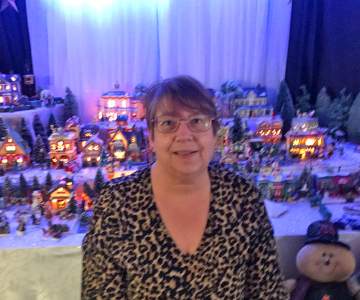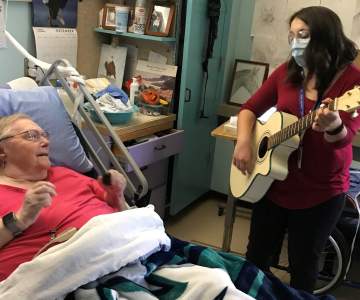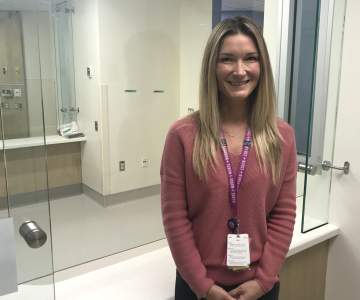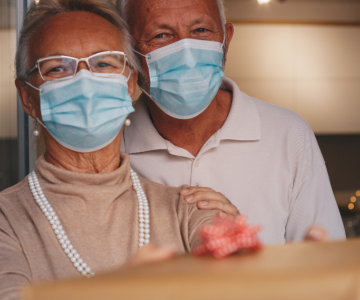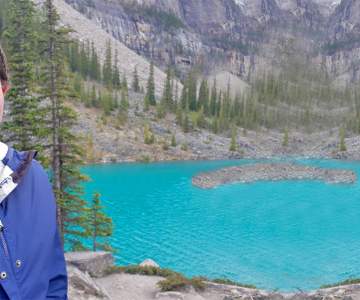Breadcrumb
Explore Stories
1 Minute Read
Community & Culture
Two Social Workers from Royal Inland Hospital (RIH), Carla Williams and Brenda Tynan, have helped the community shed some light on the reality of increased loneliness among seniors due to COVID-19 over the holiday season.
Before the holidays, they reached out to School District 73 and offered an opportunity for children and youth to do something for elders in the community: let the know - you are not alone.
Grade 5 and 6 class at Rayleigh Elementary are among students from across the District who made cards for seniors this holiday season - SD73 PhotoThe response was overwhelming and the week before Christmas, they delivered messages to 1300 seniors in long-term care across Kamloops, Clearwater, Barriere, and Merritt.
Messages like these:
“I miss my loved ones too that I can’t see. But I am here for you.”
“I would give you the biggest hug if I could.”
“We care about you, we’re thinking about you all the time, and we are missing you.”
Read more about this project and the amazing messages from our youth on the School District 73 website.
2 Minute Read
Community & Culture
We are IH is a recognition campaign to spotlight Interior Health employees and medical staff – through pictures and stories.
Name: Doris Charest
Worksite: East Kootenays/Kootenay Boundary Staffing Service Centre, Ktunaxa (Tun-ah-hah) / Kootenay Ktunaxa
Years of Service: 9.5
Job Title: Portfolio Clerk
The holiday season is like no other at the Charest family home. Doris Charest, Interior Health’s (IH) endearing Portfolio Clerk, handcrafts many of the festive ornaments that make up her Christmas décor. It’s no secret that she has quite the artistic side; apart from enjoying decorative tole painting, Doris has also been cutting out wooden Christmas decoration pieces for over 15 years.
Apart from her crafty nature, Doris loves the outdoors where she can be found immersing herself in a book next to a cozy campfire. True to the nature of anyone born and raised in British Columbia’s beautiful Cranbrook city, she enjoys the many lakes, campgrounds and mountains that surround her. In the future, she looks forward to having grandchildren, helping raise them in the very community she and her children grew up in. Till then, she gives her unconditional love to her grand puppy, Izzie, an affectionate SPCA rescue.
Over nine years ago, Doris found herself at a cross-roads when she received a recommendation from a fellow Interior Health employee and friend; she applied knowing it would be a great place to work. Starting her career at IH off with a casual role at reception and Short Call desk, Doris was soon promoted to a full-time position as a Portfolio Clerk. She continues working in this role today at the Staffing Service Centre in East Kootenay/Kootenay Boundary. Her kind and helpful demeanour does not go unnoticed as she helps her team solve problems together.
While the holidays are undoubtedly different this year, the lights at the Charest home continue to shine on as brightly as ever. Thanks for everything you do for Interior Health, Doris! We wish you many more successful years.
Nominate your colleagues to keep the We Are IH loop going:
Name: Ceilidh Stump
Message: She is wonderful person who is a great listener and very helpful and always there when you need her.
For more information contact EmployeeExperience@InteriorHealth.ca.
1 Minute Read
Community & Culture
The holiday season is an especially poignant time as families and loved ones gather. This year, of course, will be different, as we stay close to home with our households or core bubbles, and those in care won’t have the visitors they normally would.
To acknowledge these struggles and the importance of connection with our loved, ones, Interior Health has partnered with singer, songwriter, and artist, Heather Gemmell, on a song accompanied by images from across our region.
Heather takes her inspiration from her community and the beautiful East Kootenay region where she resides. As with all of us, she’s been keeping to her household bubble with her husband and nine-month old daughter.
“We hope you feel the warmth, love, and connection this song is about."
Heather Gemmell
To all patients, residents, and families, may the New Year bring renewed hope, peace and joy to you and your loved ones.
2 Minute Read
Community & Culture
All aspects of life look different these days, and that is especially evident in long-term care. Programming has changed, gathering is restricted, and visitors are limited.
Throughout the many challenges, Music Therapy continues to support people living in long-term care homes, their families, and their health-care teams.
At Summerland's Dr. Andrew Pavilion, music therapist Kayla Turnbull works in collaboration with the health-care team to help those experiencing mental health concerns and feelings of isolation.
“The music therapy keeps my mom stimulated and it triggers wonderful memories and brings such joy. It’s phenomenal,” says Nancy Smith, whose mother lives at the Dr. Andrew Pavilion.
Certified Music Therapists complete a Bachelor’s Degree and internship with formal training in music, psychology, and in the assessment of clinical conditions.
Music therapist Kayla Turnbull drums with Norris Hunt.
Whether sharing favourite songs, providing space for remembering, or supporting a resident in song creation, Kayla meets her clients however they are in that moment. She has a unique role, and brings a wealth of knowledge in music and how it affects health and well-being for older adults with chronic conditions.
Kayla helps those experiencing complex grief, and often witnesses smiles, tears, laughter and connections with significant songs from the past.
“The joy, happiness and their moods are uplifted. The interaction and connection makes such a huge difference in their day,” says Colette More, a unit clerk at Dr. Andrew Pavilion.
Music has the ability to cross cultures, languages, and abilities.
While we find our way during this time, remember the words of famous song-writer Vera Lynn: “We’ll meet again some sunny day”.
1 Minute Read
Community & Culture
As we look back on 2020, we are thankful to those who shared their lives with us this year.
Your stories have captured the strengths, challenges, and hopes of those who live in our communities. May we continue to support each other with compassion, care and love.
3 Minute Read
Health & Wellness
Growing up in Penticton, Lindsay Dionne always knew the South Okanagan was a great place to live. A registered nurse, she spent a small part of her health-care career outside of her home town, but always maintained her ties to the area.
Now a nurse educator in the intensive care unit and the emergency department, Lindsay has been working at Penticton Regional Hospital since 2003, save for that quick jaunt to the lower mainland.
“My family is here and it’s a nice community,” says Lindsay. “The hospital has a great community feel to it as well. It’s a friendly place to work. It’s a regional site so you have a lot of interesting work to do. You get a well-rounded experience.”
With the opening of the David E. Kampe Tower in April 2019, Penticton saw its hospital modernized with a six-storey tower and parkade. Once the tower opened, crews began to work on Phase 2 of the project, including a major renovation and expansion of the PRH emergency department.
This November, the first part of the new ED will open to patients with new patient check-in and registration areas, complete with a new process for patients coming for care.
“The way we used to do things was the patient came in and presented to registration first and then saw a nurse,” explains Lindsay. “We’ve changed the process to what’s called ‘nurse first’ so the nurse will assess patients when they come in and we will see where they go depending on their needs.”
The registration process will follow the assessment. The change in process is considered best practice and is being done in other hospitals in Interior Health and right across the province.
“It’s designed so that we see the sickest people first,” she says.
In planning for the expansion of the emergency department at PRH, Lindsay and some members of the IH Capital Planning & Projects team travelled to a few different hospitals in B.C., learning how they assess and treat patients so they could ensure the new department at PRH is on the cutting edge of patient care.
Everything is designed with the patient in mind and to provide the best working conditions for emergency department team members. The patient check-in and registration area opens Nov. 16 while renovations continue in the main ED, creating enhanced patient care spaces that will see a phased opening from January 2021 to early 2022.
“It’s going to be a much bigger space. There will be more nurses and staff, more designated treatment areas, a much more comfortable setting,” says Lindsay, noting that patient rooms will be divided by walls as opposed to curtains when the ED opens, increasing privacy and infection prevention and control measures.
Along with the work in the PRH emergency department, there are also renovations taking place in the PRH pharmacy and material stores.
4 Minute Read
Health & Wellness
The holiday season is upon us and in many ways it feels the same as ever: Long dark nights are made brighter with festive light displays; classic carols are in rotation on the radio; and young children are eagerly making wish lists and doing their best to ensure they stay on the ‘nice’ list.
But in other ways the holidays look quite different this year. Shopping, visits with Santa, faith gatherings and office parties have moved online; trips are postponed; and many people are planning a very different kind of celebration in order to maintain physical distancing and prevent the spread of COVID-19.
There is no doubt that this year’s pandemic has taken a toll. There are many people facing health impacts of the virus; some families are grieving loved ones who have passed away; and even more are facing financial hardship or other stresses due to COVID-19.
The holidays can be stressful at the best of times but this year it is more important than ever to take care of yourself and your mental health.
12 tips to manage stress and make the most of this holiday season
1 Help others, volunteer
Volunteering your time or doing something to help others is a good way to lift your spirits and broaden friendships. For example, consider dropping off a meal at a friend's home or deliver baked goods to a neighbour during the holidays – particularly for those who may be alone.
2 Stick to a budget
Avoid overspending to compensate for scaled back celebrations or spending time with loved ones. Make a budget and stick to it.
3 Maintain healthy habits
Avoid overindulging in food, and keep up exercise routines as much as possible. Although the drinks may be flowing over the holidays it’s important to moderate drinking. Alcohol can have a negative impact on mood and affect your motivation around healthy habits like exercise. Getting enough sleep is also important for physical and mental health.
4 Practice gratitude
Although our gatherings may look different this year, there is still much to be grateful for. Look out the window and take the time to appreciate the colours. Notice the wind in the trees. Indulge your sense of wonder in this world. There is strong evidence that documenting the things you are grateful for can lift our mood.
5 Be intentional about how you spend your time
Devote time to being intentionally present by taking deep breaths, observing your surroundings and being in the moment. Take a break from worrying or focusing too much on challenges.Moderate screen time; take a break from the constant news cycle and social media, and avoid binge watching TV.
6 Spread positivity
Although we are wearing masks in public that hide our smiles, we can still share good old fashioned greetings. A chipper word or two creates community and reduces isolation. “Hello”, “Hi!”, “Good morning”, “After you” and “Happy holidays!” help us feel connected.
7 Reach out if you are feeling lonely or sad
Talk to a friend or family member - try reaching out with a text, a call or a video chat. Or engage in online community, religious or other social events, support groups, social media or virtual events that can provide support and companionship. Organize a Zoom party so friends and family can visit from the safety of home, or schedule an outdoor activity - you can go for a walk, bike ride or snow shoe outdoors with a friend or family member you don’t live with. Just ensure you can maintain physical distance and don’t turn the activity into a group meeting.
8 Don’t romanticize holidays past
The holiday season brings expectations and stress for many people, and it is rarely perfect. The season won’t always be merry and bright, even at the best of times – and that is okay.
9 Start new traditions
Find creative ways to mark the season that accommodate current Public Health Orders – they may even become new traditions: Take a stroll through the neighborhood to view the lights; Surprise loved ones by leaving baked goods on their doorsteps; Or host an online ‘watch party’ with friends and family, complete with popcorn, eggnog and a classic holiday movie. Try new online activities such as trivia contests, karaoke parties, or building creative structures from household materials.
10 Remember, this too shall pass
Feeling dragged down by current events? Take the long view and find comfort in a time-tested saying that inspires you. Use the saying as much as you need to give you faith, comfort and hope. “This too shall pass” is a great example! The pandemic and resulting Public Health Orders are temporary.
If you are experiencing prolonged mental health challenges, such as sleep or appetite issues, low mood, or problematic substance use contact your primary care provider or local counsellor in your community.
If you are experiencing feelings of hopelessness and thoughts of self-harm, call the 24/7 Interior Crisis Line at 1-888-353-CARE (2273). This confidential and free service is available day and night, even on the holidays.
By being creative, focusing on the positive, keeping some perspective, and reaching out when we need help, we can not just survive this holiday season but even thrive.
3 Minute Read
Community & Culture
We are IH is a recognition campaign to spotlight Interior Health employees and medical staff – through pictures and stories.
Name: Brianna Hawkins
Worksite: Rocky Mountain Lodge, Ktunaxa (Tun-ah-hah) / Kootenay Ktunaxa
Years of Service: 6
Job Title: Registered Dietitian
Growing up in Kitimat, a small town in northern British Columbia, Brianna was motivated to pursue a career in health care from a young age.
She found herself immersed in health care throughout her childhood, encouraged by her father's love for his career as a Lab Tech. Through her love of cooking, nutrition, and sciences, Brianna found her niche as a dietitian.
Eager for new experiences and furthering her education, Brianna spread her wings to another province and enrolled in the Registered Dietitian program at the University of Alberta. Inspired by her preceptors to relocate outside of Calgary after completing her internship in 2014, Brianna knew she wanted to move back to beautiful British Columbia. With only three suitcases in tow, she moved to Cranbrook. The plan was to only stay a year, but during that time, the Kootenays captured her heart and she is here to stay, luckily for us!
In her current role as a Dietitian at Rocky Mountain Lodge, Brianna loves working in both renal and acute care, making each day different and exciting. As part of the amazing renal team, she enjoys working with patients over months, or even years to experience real change and possibly delay dialysis. It’s moments like these that help her realize she is making a difference in the lives of others.
“I love the challenge of working in acute care, using a different set of skills and the fact every day is so different. I have an amazing dietitian co-worker who I learn from every day” - Brianna Hawkins
A dietitian's major role is to help patients adapt to the dialysis diet so they can enjoy some of their favourite foods while still being aware of dietary recommendations. The dialysis diet can be restrictive and very challenging for patients to navigate. Having the support of a knowledgeable dietitian is crucial to help manage a chronic condition.
“I love being able to talk to patients about food and seeing the joy in their eyes when they can have their favourite Christmas dish or enjoy something special for their birthday.” - Brianna Hawkins
A traveler at heart, Brianna is patiently waiting until she can explore new places again. First stop, Germany, followed by Peru and then Australia. In the meantime, she will continue to dream of planning her wedding in Hawaii!
Luckily during these times, Brianna can continue to be out hiking, running, and exploring the beautiful outdoors. As an avid chef, she spends a lot of time cooking delicious meals and trying new recipes. Thank you for all that you do, Brianna!
Nominate your colleagues to keep the We Are IH loop going: Name: Georgi Winger Message: As a Chronic Kidney Disease Nurse, she does an amazing job keeping track of all our patients, managing an ever-increasing load, and is always there is talk! I couldn’t do my job without her!
For more information contact EmployeeExperience@InteriorHealth.ca.
3 Minute Read
Health & Wellness
When people feel comfortable in a space, they are more likely to visit.
With this in mind, the Aboriginal Mental Wellness team has been looking at ways to make spaces that provide mental health and substance use services more welcoming and culturally safe.
Conversations with Aboriginal partners, clients, families, and care providers have shown us there are a number of ways we can create welcoming spaces and improve the quality of care for Aboriginal people.
Physically welcoming spaces
Warm lighting (less use of fluorescent)
Comfortable seating
Private spaces (especially when located with other services)
Using natural elements to soften spaces
The need for spaces to be seen as healing rather than medical or clinical
Having a recognized space for cultural/ traditional practices
Emotionally welcoming spaces
Welcome signs, general signage, and waiting room resources in the language(s) of the Aboriginal people in the area
Acknowledgement of the traditional territory of the local First Nations
Acknowledgement of Métis and Inuit peoples accessing the space
Aboriginal clients and families able to see themselves and their Nations represented in the environment through art and other culturally relevant items
A map of the area showing First Nations and Métis Nation BC Chartered Communities
A friendly reception and help finding your way
Welcoming spaces that recognize our relationship with Aboriginal people
Spaces should reflect the holistic Aboriginal worldview
Art and knowledge on the walls that represents the distinct Aboriginal communities in area
Show the interconnected nature of Aboriginal cultures
Post the official commitments made to Aboriginal partners
Prior to deciding where to locate services, be conscious of associations Aboriginal people may have with other organizations in the building
Spiritually welcoming spaces
Provide opportunities for clients and families to practice cultural ceremonies
Hosting culturally safe ceremonies, circles, and land-based teachings with Aboriginal partners
Access to traditional healers and elders
Access to sacred spaces
All Interior Health staff receive cultural safety training which includes education about the history of colonization in Canada and the negative impact this history has on the health and wellness of Aboriginal peoples.
For community health facilitator Cathy Collinge, this training led to a curiosity about how she could make her workplace (Lansdowne Centre in Kamloops) culturally safe and welcoming.
Cathy and her colleagues started by creating an advisory committee with the support of their Aboriginal mental wellness team. They invited members of the Secwépemc Nation, surrounding Nations, people accessing services at Lansdowne Centre, Elders and Knowledge Keepers to join.
Since its inception, the committee has made a number of recommendations for creating welcoming and safe spaces and services. Many of their recommendations have been implemented through a grant received from the Royal Inland Hospital Foundation.
A mural was completed at Community MHSU Lansdowne Centre in November.
Spelq̓wéqs
Pronounced “spell-kwaks”, Spelq̓wéqs is the Secwepemctsin name for turtle
“For me, turtles represent longevity, patience, nurturing, and wisdom,” says artist Chris Bose. “In this mural, I have the mother turtle swimming with two baby turtles through an ocean of life and hope and promise."
The work to create welcoming spaces continues to evolve. The advisory committee recently recommended surveying Kamloops staff and physicians working in mental health and substance use to determine areas of interest for learning.
Learning about Aboriginal cultures and reflecting those learnings in the places where care is offered can create positive change. “Culture is healing and an integral part of our health and well-being,” says Métis Elder Gwen Campbell McArthur, Kamloops advisory committee member.
“The mental health professional has a degree, but that does not make them the expert, in fact, the person seeking treatment is the expert on themselves. When someone seeks services, they do not come alone. They come as part of a family, a community and indeed a nation.”
Are you interested in learning more? Check out the Interior Voices podcast.
-
Load More
Showing 567 of 678
STAY CONNECTED
Receive news and alert posts, and Stories@IH blog posts, right to your inbox!


